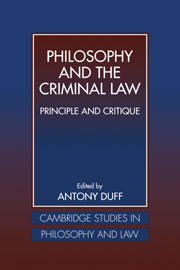Book contents
- Frontmatter
- Contents
- List of Contributors
- Introduction
- 1 Contingency, Coherence, and Conceptualism: Reflections on the Encounter between ‘Critique’ and ‘the Philosophy of the Criminal Law’
- 2 Does Criminal Liability Require an Act?
- 3 ‘Simulacra of Morality’? Beyond the Ideal/Actual Antinomies of Criminal Justice
- 4 Principle and Contradiction in the Criminal Law: Motives and Criminal Liability
- 5 On the General Part of the Criminal Law
- Index
4 - Principle and Contradiction in the Criminal Law: Motives and Criminal Liability
Published online by Cambridge University Press: 17 September 2009
- Frontmatter
- Contents
- List of Contributors
- Introduction
- 1 Contingency, Coherence, and Conceptualism: Reflections on the Encounter between ‘Critique’ and ‘the Philosophy of the Criminal Law’
- 2 Does Criminal Liability Require an Act?
- 3 ‘Simulacra of Morality’? Beyond the Ideal/Actual Antinomies of Criminal Justice
- 4 Principle and Contradiction in the Criminal Law: Motives and Criminal Liability
- 5 On the General Part of the Criminal Law
- Index
Summary
In Crime, Reason and History (1993), Alan Norrie aimed to show that ‘criminal law is neither rational nor principled’ (p. 9). Whilst not ‘wholly irrational’, it cannot claim to be ‘(in principle) rational and just’ (p. 14), because ‘irrationality and “unprinciple” are as much a part of [it] as their opposites’ (p. 57). We cannot hope to achieve ‘a rational principled criminal law’, because legal reasoning is ‘necessarily contradictory’ (p. 11). Thus, whilst Norrie eschews the ‘simple negation’ of the ‘trashing’ practised by some proponents of Critical Legal Studies (p. xiii; see Kelman 1981, 1984) and insists that we must recognise the ‘positive’ aspects of this contradictory system (see pp. 31–2, 132, 223–5), he shares their aim of undermining the criminal law's claims to principled rationality by exposing the contradictions that infect it.
Two years earlier, Andrew Ashworth published Principles of Criminal Law (1991). Nothing in the book suggests that he intended its title to be ironic. Ashworth ‘does not argue that English criminal law is grounded in a stable set of established doctrines’, because its development is influenced by ‘a disparate group’ of ‘sometimes conflicting’ arguments and assumptions. But he does hope to identify, and subject to rational appraisal, ‘the principles and policies which appear to play a significant part’ in the criminal law: Are they ‘soundly based’, suitable to ‘the proper aims, forms and limits of the criminal sanction in modern Western societies‘; or are there ‘other principles and policies which would be more appropriate’ (p. v)? He thus seems to believe that English criminal law (to some degree) is, and (to a greater degree) could and should become, a matter of principle – and so of reason, insofar as principles are purportedly rational.
- Type
- Chapter
- Information
- Philosophy and the Criminal LawPrinciple and Critique, pp. 156 - 204Publisher: Cambridge University PressPrint publication year: 1998
- 10
- Cited by

